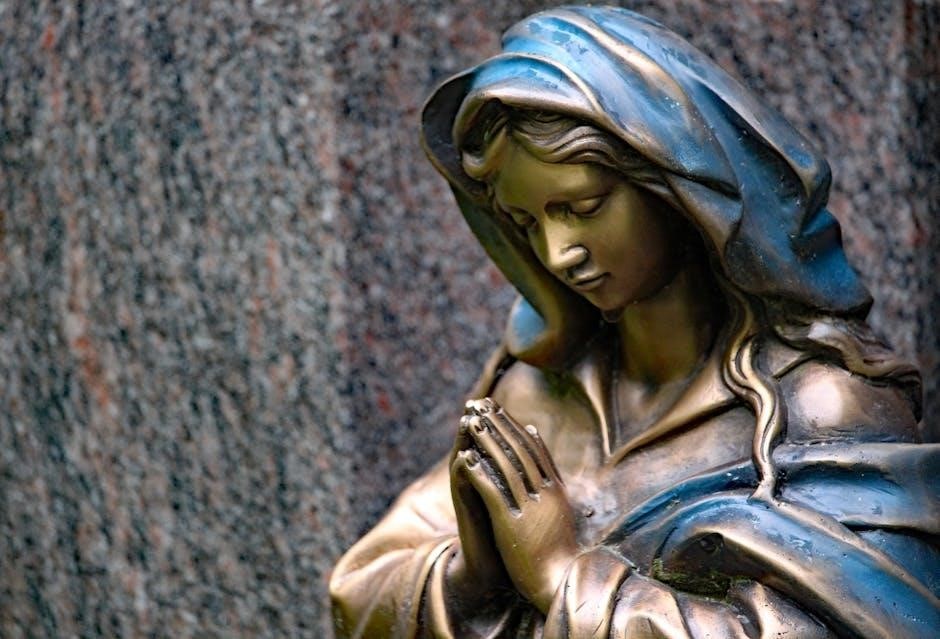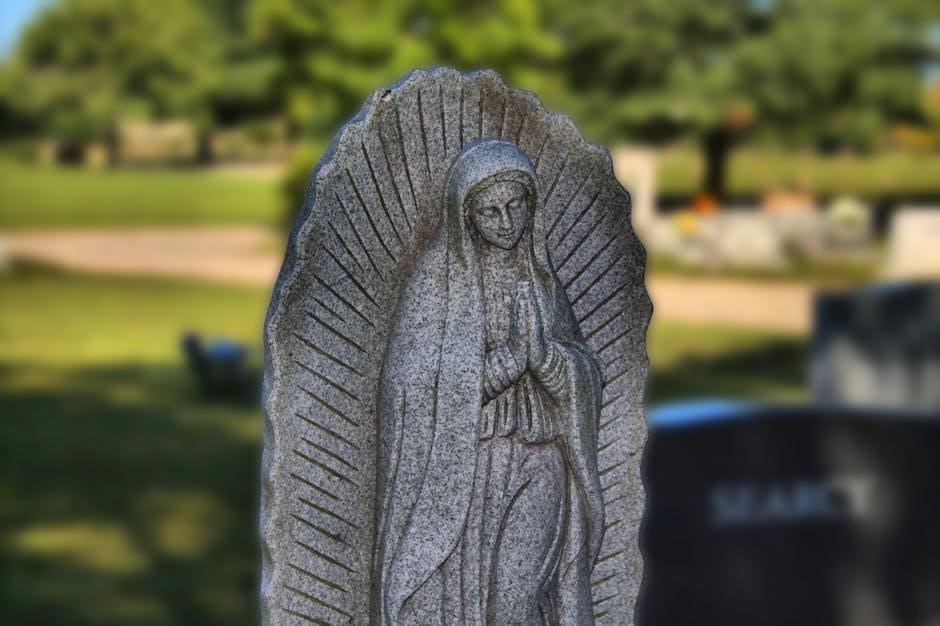
catholic prayer for the dead eternal rest pdf
Overview of Catholic Prayers for the Dead
Catholic prayers for the dead, like the Eternal Rest Prayer, seek to comfort the grieving and assist the deceased in their journey to eternal rest. These prayers, often recited during funeral rites and novenas, reflect the Church’s belief in the purification of souls and the hope of eternal life through Christ.
1.1 The Significance of Praying for the Dead in Catholicism
Praying for the dead is a profound Catholic tradition rooted in the belief that the living can assist the deceased through intercession. It reflects the Church’s teachings on purgatory, where souls undergo purification before entering heaven. Prayers, such as the Eternal Rest Prayer, offer comfort to the grieving and spiritual support to the departed, embodying the hope of eternal life and the communion of saints.
1.2 The Role of Prayer in the Catholic Funeral Rites
Prayer plays a central role in Catholic funeral rites, offering solace to the mournful and spiritual support to the deceased. The Eternal Rest Prayer and other invocations are recited to seek eternal rest for the soul and comfort for the grieving. These prayers, often part of the liturgy, reflect the Church’s belief in the power of intercession and the hope of resurrection, emphasizing the community’s unity in faith and compassion.
The Structure of the Novena Prayer for the Dead
The Novena Prayer for the Dead is a nine-day devotion, with specific daily prayers, invocations, and litanies, concluding with a final prayer for eternal rest and mercy.
2.1 Daily Prayers and Invocations
The Novena Prayer for the Dead includes daily prayers and invocations, each focusing on specific themes such as mercy, forgiveness, and eternal rest. Leaders guide participants through prayers like the Our Father, Hail Mary, and the Litany for the Faithful Departed. Each day’s prayers are tailored to assist the soul’s journey, emphasizing trust in God’s compassion and the hope of eternal life. The structure ensures a meaningful and consistent devotion over nine days.
2.2 The Importance of the Nine-Day Period
The nine-day novena holds deep significance in Catholic tradition, symbolizing completion and renewal. Rooted in biblical examples, such as the nine months of pregnancy and the nine days between Christ’s Ascension and Pentecost, the novena reflects a commitment to prayerful devotion. This period is believed to assist the soul’s purification, offering a structured way to intercede for the deceased and seek eternal rest for them.

Key Prayers for Eternal Rest
The Eternal Rest Prayer and the Prayer for Departed Loved Ones are central, seeking eternal rest for the deceased and comforting the grieving through divine intercession.
3.1 The Eternal Rest Prayer (Requiescant in Pace)
The Eternal Rest Prayer, known as Requiescant in Pace, is a traditional Catholic prayer for the deceased, seeking eternal rest and peace for their souls. It expresses trust in God’s mercy and compassion, asking for the soul’s swift entry into heaven. Often recited during funeral rites and novenas, this prayer provides comfort to the grieving while invoking divine assistance for the departed.
3.2 The Prayer for Departed Loved Ones
The Prayer for Departed Loved Ones honors the memory of family, friends, and all the deceased, entrusting them to God’s love. It acknowledges life’s continuity after death and seeks eternal joy for those who have passed. This heartfelt prayer, often used in personal devotion and novenas, reflects Catholic belief in the Communion of Saints and the hope of eternal life through Christ.
The Role of Purgatory in Catholic Prayers for the Dead
Purgatory is a purification process for souls before heaven, and prayers for the dead assist in this cleansing, reflecting Catholic belief in divine mercy and redemption.
4.1 Understanding Purgatory and Its Significance
Purgatory is a temporary state where souls undergo purification before entering heaven, cleansing from earthly sins. It reflects God’s mercy, allowing souls to reach holiness. Catholics believe prayers, especially the Mass, help souls in purgatory attain eternal rest. This doctrine emphasizes the Church’s belief in divine justice, mercy, and the communion of saints, uniting the living and the dead in spiritual support.
4.2 How Prayers Help the Souls in Purgatory
Prayers for the dead, such as the Mass and Eternal Rest Prayer, are believed to assist souls in purgatory by cleansing them of remaining sins. These prayers, offered in love and solidarity, provide spiritual comfort and hasten their entrance into heaven. The Church teaches that such devotions reflect God’s mercy and the unity of the faithful, both living and deceased, in their shared journey toward eternal life.
The Catechism of the Catholic Church on Prayers for the Dead
The Catechism emphasizes that praying for the dead reflects the Church’s belief in the communion of saints and the hope of eternal life through Christ’s resurrection.
5.1 Relevant Teachings from the Catechism
The Catechism emphasizes that the Church has always honored the memory of the dead and offered prayers for them, particularly through the Eucharistic sacrifice. It teaches that such prayers assist the souls of the deceased in their purification, helping them attain eternal life. This reflects the hope rooted in Christ’s resurrection, affirming the Church’s belief in the communion of saints and the eternal unity of God’s people.
5.2 The Hope of Eternal Life Reflected in Prayers
Catholic prayers for the dead embody the hope of eternal life, rooted in Christ’s resurrection. They express trust in God’s mercy and the belief that the deceased will join the saints in heaven. These prayers console the living and affirm the Church’s conviction that death is not the end, but a transition to eternal rest with God. This hope is central to Catholic teachings on prayer for the departed.
The Litany for the Faithful Departed
The Litany for the Faithful Departed is a solemn prayer recited for the deceased, invoking saints and angels to intercede for their souls. It is often included in novenas and funeral rites, offering comfort and hope to the grieving while seeking God’s mercy for the departed.
6.1 The Structure and Content of the Litany
The Litany for the Faithful Departed follows a structured format, typically led by a priest or leader, with responses from the congregation. It includes invocations to saints, angels, and the Blessed Virgin Mary, asking for their intercession. The litany also incorporates prayers like the “Kyrie Eleison” and “Christe Eleison,” seeking God’s mercy for the deceased. Its content emphasizes hope, forgiveness, and eternal rest, providing solace to mourners while honoring the departed soul.
6.2 Its Role in the Novena and Funeral Rites
The Litany for the Faithful Departed is a vital component of both the novena and funeral rites, offering prayers for the deceased’s soul. Recited daily during the nine-day novena, it seeks to comfort mourners and assist the departed in their journey to eternal rest. In funeral rites, the litany is often recited during the vigil or Mass, providing solace to the grieving and affirming the hope of resurrection and eternal life through Christ.

The Our Father and Its Significance in Prayers for the Dead
The Our Father is central in prayers for the dead, offering comfort to mourners and spiritual support for the deceased, aiding their journey to eternal rest.
7.1 The Lord’s Prayer in the Context of Mourning
The Our Father, or Lord’s Prayer, is deeply embedded in Catholic mourning rituals, offering solace to the bereaved while interceding for the deceased. It expresses forgiveness, mercy, and hope, aligning with the belief in eternal rest and divine judgement. The prayer’s universal appeal makes it a cornerstone during funeral services and novenas, providing spiritual unity between the living and the dead.
7.2 Its Use in Funeral and Memorial Services
The Our Father is integral to Catholic funeral and memorial services, offering comfort to mourners and spiritual support for the deceased. Recited during Mass, it seeks divine forgiveness and eternal rest for the departed, while uniting the faithful in prayer. This tradition reflects the Church’s belief in the power of communal prayer to aid souls in their journey to eternal life.
The Importance of the Holy Rosary for the Dead
The Holy Rosary is a powerful prayer for the dead, offering solace to mourners and spiritual aid to souls in purgatory. Its recitation, especially the Sorrowful Mysteries, seeks to honor the deceased and assist their journey to eternal rest through the intercession of the Blessed Virgin Mary.
8.1 The Sorrowful Mysteries and Their Relevance
The Sorrowful Mysteries of the Rosary, reflecting on Christ’s Passion, are deeply relevant when praying for the dead. They connect the deceased’s journey to Christ’s redemptive sacrifice, offering spiritual aid to souls in purgatory. The mysteries emphasize the hope of eternal life, providing comfort to the grieving while interceding for the departed through the Blessed Virgin Mary’s maternal care and intercession.
8.2 Praying the Rosary for the Souls in Purgatory
Praying the Rosary for the souls in purgatory is a powerful Catholic tradition that offers spiritual aid to the departed. The Sorrowful Mysteries, focusing on Christ’s Passion, are particularly relevant as they underscore the redemptive value of suffering. By reciting the Rosary, the faithful intercede for the souls, seeking their purification and entry into eternal rest. This prayer practice provides solace to the grieving while assisting the deceased in their journey toward heaven.

The Role of the Communion of Saints in Prayers for the Dead
The Communion of Saints unites the living and the dead, enabling intercession for souls in purgatory. This spiritual bond strengthens prayers for eternal rest and divine mercy.
9.1 Understanding the Communion of Saints
The Communion of Saints is a Catholic doctrine expressing the spiritual unity of the Church, linking the faithful on earth, the souls in purgatory, and the saints in heaven. This bond allows believers to intercede for one another, with the living praying for the dead and the saints offering their merits and prayers to aid souls in purgatory. This unity reflects the belief in the mystical body of Christ, where all members support each other spiritually.
9.2 Intercession of the Saints for the Departed
Catholics believe that the saints in heaven intercede for the deceased, offering prayers to God on their behalf. This intercession, rooted in the Communion of Saints, reflects the unity of the Church. The saints’ prayers are seen as powerful aids to help souls in purgatory attain eternal rest. By invoking the saints, the faithful participate in the Church’s tradition of spiritual solidarity, expressing hope in the deceased’s ultimate union with God.

Downloadable Resources for Catholic Prayers for the Dead
The Novena Prayer for the Dead PDF offers structured daily prayers and invocations for nine days, aiding in spiritual support for the deceased. Additional resources include guides for funeral rites, litanies, and reflections, providing comprehensive support for mourners seeking solace and eternal rest for their loved ones.
10.1 The Novena Prayer for the Dead PDF
The Novena Prayer for the Dead PDF is a comprehensive guide offering nine days of structured prayers, invocations, and reflections for the deceased. It includes daily prayers, litanies, and the Holy Rosary, particularly the Sorrowful Mysteries, to support souls in purgatory. This resource, easily downloadable, provides mourners with a meaningful way to honor their loved ones and seek eternal rest for their souls, aligning with Catholic traditions and teachings.
10.2 Other Prayer Resources and Guides
Beyond the Novena PDF, there are numerous Catholic prayer resources for the dead, including prayer books, guides, and online materials. These resources often feature the Holy Rosary, litanies, and traditional prayers like the Eternal Rest and Prayer for Departed Loved Ones. They provide structured ways to honor the deceased, offer comfort to mourners, and support the souls in purgatory through heartfelt devotion and spiritual reflection.
Catholic prayers for the dead offer comfort, support, and hope, aiding souls in their journey to eternal rest while upholding a cherished tradition of faith and community.
11.1 The Eternal Impact of Prayers for the Dead
Prayers for the dead have a profound eternal impact, offering solace to the grieving while aiding the deceased in their purification journey. These devotions, rooted in Catholic tradition, express hope in eternal life and the resurrection, aligning with the Church’s teachings on purgatory and the communion of saints. They foster a sense of community and spiritual connection, emphasizing Christ’s victory over death and the promise of eternal rest.
11.2 Encouragement to Continue the Tradition
The Catholic Church encourages the faithful to continue the tradition of praying for the dead, as it strengthens spiritual bonds and provides comfort to the grieving. This practice, rooted in the hope of eternal life, fosters a sense of community and reinforces the belief in the resurrection. By honoring this tradition, believers support the deceased in their journey and remain united in prayer, trusting in God’s mercy and love.